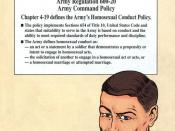Respecting The Rules
The U.S. Army Forces are currently under the "don't ask, don't tell" policy, which governs the conduct of homosexual personnel. " The policy allows gay people to serve in the military if they keep their sexual orientation confidential; it also restricts the military's right to pursue information about a service member's sexual orientation"(Williams 106). In most of the armed forces the policy is only enforced half the time. Military officers refrain from asking about sexual orientations, but still some homosexual cadets involve themselves in homosexual affairs (The military's ban against homosexuals should remain 1). A heterosexual soldier told once of his experience with his two homosexual roommates. "One night he returned to his room and noticed that the two men were in the same bunk, under the covers, in one another's arms, and face-to-face. He turned on the light and one of them scurried in to his own bed.
The next morning he had no choice but to report what he had come across the night before. If he didn't do so he would have been violating a code that states such encounters must be reported. It would have resulted in him being transferred, and written up for a violation" (The military's ban against homosexuals should remain p.2). There may be a number of good reasons to encourage homosexuality in the military, but it seems more logical to keep the policy in tact. The disagreement of the "don't ask, don't tell" policy is simply due to the discomfort of military heterosexuals, and the problems that are caused by the discomfort. The policy should remain in tact, to avoid any kind of conflict.
The policy helps secure the safety of all soldiers.
"Homosexual behavior undermines military cohesion and morale. The services' experience with mixing men and women in...


